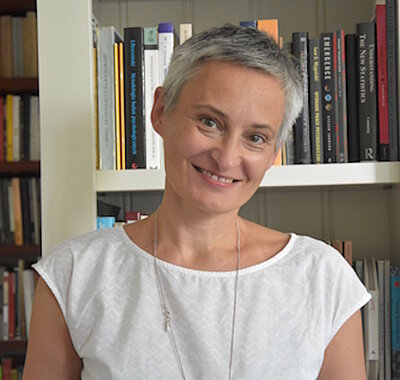Keynote Speakers
Alessandra Fasulo University of Portsmouth
Marianne Gullberg Lund University
Mathias Osvath Lund University
Joanna Rączaszek-Leonardi University of Warsaw
Alessandra Fasulo

Alessandra Fasulo talk will be about:
There's nothing in the head but brains: A situated perspective on human functioning
Alessandra Fasulo, PhD
School of Psychology, Sport and Health Sciences
University of Portsmouth
The talk will unpack the ethnomethodological challenge included in the title, and argue for a study of human activities that does not separate the inner from the outer world, but focuses instead on levels of organisation that are publicly observable where and when they unfold. This approach considers language, bodies and the social and material elements that constitute an activity field as co-constitutive of cognition and inseparable from it.
Using naturalistic observations in different settings, such as psychotherapy, workplaces and family homes, and involving people with and without communication differences, I will demonstrate how cognition is something that social actors “do” for each other and with each other, and discuss the implications of this view for theoretical development and applied work.
Marianne Gullberg

Marianne Gullberg's talk will be about:
Do gestures compensate for language difficulties?
Marianne Gullberg
Lund University
It is now widely recognised that language use is a multimodal phenomenon that involves the systematic and non-trivial integration of speech/sign (of sing language) and gestures both in language production and comprehension. However, a frequent parallel assumption is that gestures are essentially compensatory devices and help addressees understand unclear messages and speakers convey information they have difficulties expressing. Somewhat surprisingly, these assumptions are also found in theories about the relationship between speech and gesture. I will challenge this compensatory view of the speech-gesture link drawing on both comprehension and production studies. In comprehension, I will show that individual experience and contextual factors mitigate the degree to which gestures improve understanding. For production, I will demonstrate that gestures are coordinated with fluent, not disfluent speech; that speech and gestures express similar, not different information; and that when gestures are recruited as problem-solvers, the problems are often not lexical. Based on these findings, I argue for a more nuanced view of the speech-gesture relationship in both comprehension and production.
Mathias Osvath

Mathias Osvath talk will be about:
Thought for food – or why you can think
Mathias Osvath
Cognitive Zoology Group
Lund University
The evolution of whole-body endothermy occurred independently in dinosaurs and mammals and coincided with some of the most significant neurocognitive shifts in life's history. These included a 20-fold rise in neuron numbers and the emergence of new brain structures, supporting similar functions in both lineages. We propose the endothermic brain hypothesis, which holds that elaborations in endotherm brains evolved to boost caloric intake through efficient foraging. The hypothesis rests on the intrinsic link between cognition and organismal self-maintenance. To support the ~30-times increase in food intake required by endotherms compared to ectotherms, we suggest that their model-based cognitive repertoires expanded, along with more detailed cognitive maps, as such cognition is known to enable far more efficient foraging than model-free exploration and learning. In this talk I will present some of our work comparing the cognitive skills of crocodilians with those of the neurocognitively least derived birds. These groups phylogenetically bracket the extinct non-avian dinosaurs, in which endothermy and the proposed cognitive adaptations evolved, helping us trace the changes that unfolded over these critical 200 million years.
Joanna Rączaszek-Leonardi

Joanna Rączaszek-Leonardi talk will be about:
Can we Begin with Context?
Ecological and enactive methods integrate for the study of cognition in interaction
Joanna Rączaszek-Leonardi
Human Interactivity and Language Lab
University of Warsaw
Our cognition develops in a social world that is structured by the presence and actions of others. The “action-first” cognition is immanently for co-action: it arises by participating in meaningful events with living and feeling beings. In the first months of life a reliable “caregiver permanence” is much more important than any “object permanence”; control over the world and agency develops in engagement, by learning the structures and timings of participation. Ecological psychology seems to have adequate theoretical tools to understand perception and action in engagement. Due to its radical empiricist roots, it is concerned not with individual mind cognizing an independent world, but, rather with relations, the primary of which is the relation between the organism and its environment. Dynamical systems tools used by ecological psychology are able to capture the complexity and multi-scalar nature of engagements, while the recognition of the ubiquitous environmental structures orient researchers towards description of the world in terms of standing patterns of behavior emergent from, and, in turn, constraining co-action. Enactivism can complement this understanding by foregrounding human experience as an omni-present relatum in every perception and action. Our own movement is felt in its “kineasthetic livelines” and the various nature of engagements can be distinguished on the basis of our first- and second-person experience. In my talk I would like to point to the promise of integrating these two approaches for the study of mind and cognition arising in human interaction, and point to the most urgent challenges that face development of the concrete methods to capture experience in engagement.
